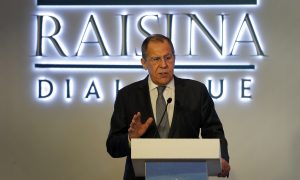Russia on Wednesday criticized the United States for introducing a new Indo-Pacific concept it said was aimed at containing China. The comment, from a top Russian official, echoes Beijing’s own complaints about the United States’ initiatives in the region.
Addressing a global conference in the Indian capital to discuss the most challenging issues facing the world community, Russian Foreign Minister Sergey Lavrov said that Asia-Pacific cooperation until now was centered on Southeast Asia.
The Indo-Pacific concept being pushed by the United States, Japan and others was to reconfigure the existing structure, he said.
“Why do you need to call Asia-Pacific as Indo-Pacific? The answer is evident — to exclude China. Terminology should be unifying, not divisive,” Lavrov said in remarks at the Raisina Dialogue.
The United States says the Indo-Pacific engagement framework supports sovereignty, transparency, good governance and a rules-based order among other things. By using Indo-Pacific, the U.S. also wants to propagate the idea that it’s a region that stretches far beyond China’s backyard and the tiger economies of East Asia, and includes the Indian Ocean.
In 2018, the U.S. Pacific Command became the Indo-Pacific Command.
China’s assertive territorial claims in the South China Sea, through which a third of global shipping passes, have drawn rebuke from the United States and become a flashpoint for a region in which Southeast Asian nations Vietnam, the Philippines, Malaysia and Brunei all have rival claims.
On Wednesday, Lavrov also accused Western countries of not strictly following the United Nations charter for discussions based on sovereign equality of states, noninterference in internal matters, territorial integrity and peaceful resolution of disputes.
“Western friends are using international law less and less. Instead, they have coined a new concept which they call as a rules-based world order,” he said.
American officials and those in allies countries, like Japan and Australia, have used the term “rules-based order” for some time. Definitions vary, but are centered on a unified system governing global political and legal rules, usually understood to include international law. Russia and China are often charged with flaunting the boundaries of the so-called rules-based order.
Lavrov said that Russia was very much concerned with the situation in the Persian Gulf region and suggested that Gulf countries start thinking about a collective security mechanism as a confidence-building measure.
He said Iran had proposed a non-aggression pact to other Gulf states. Russia recently held military exercises with China and Iran in the region to see how to ensure safe shipping, he said.
Russia hopes the five permanent members of the U.N. Security Council plus the European Union and Organization of Islamic Cooperation would participate in the collective security mechanism.
By Ashok Sharma for the Associated Press with additionally reporting by The Diplomat.

































